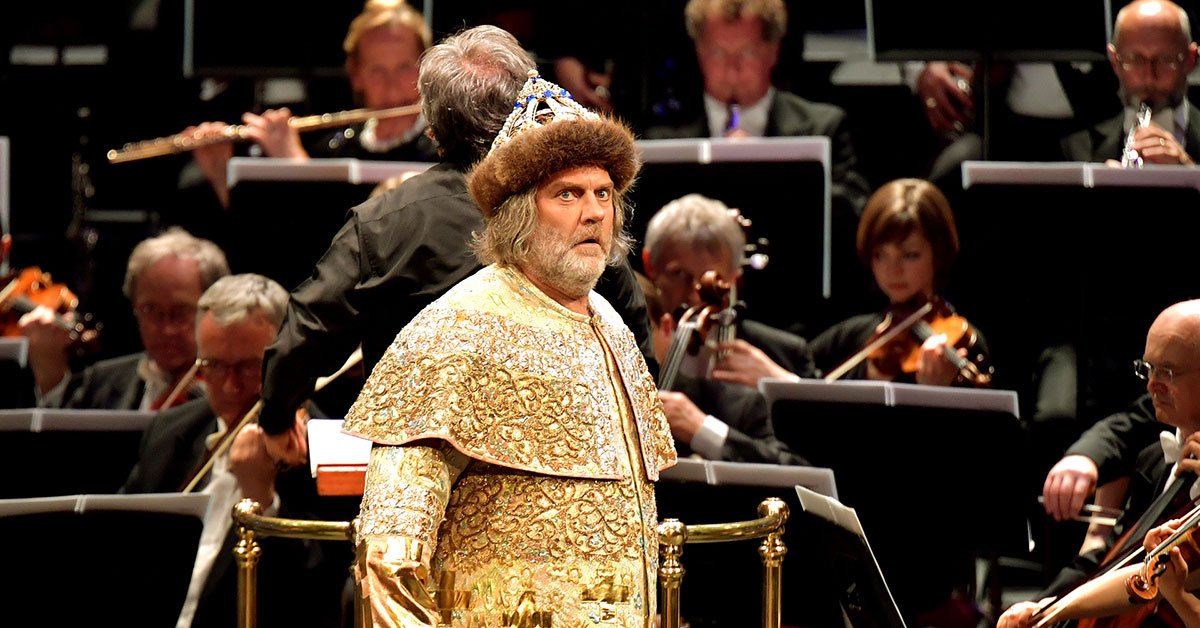 |
| Terfel as Tsar: Boris Godunov at the London Proms |
The acoustics in the arena, while less than stellar, didn't bother me as much as the last time I was here. Pappano's propulsive account of the score came across well, with sharp, expressive details emerging from the tapestry of the whole. The great bells booming from the gallery gave me chills. I was particularly impressed by the richness of the strings, and the nuances of dynamics and tempi, which did much to communicate the essentials of the drama. It is pertinent to note that there were no surtitles, and I understand only such Russian as I've picked up from operas and film. I was glad of the opportunity (the first in my exclusively 21st-century opera-going experience) to see and hear how this affected my own reception. It still worked for me, obviously, and the expressive singing of chorus and principals needed no emotional translation.
The cast was very strong throughout, with John Graham-Hall a finely-drawn Shuisky, and Andrii Goniukov and Harry Nicoll a vivid double-act as Varlaam and Missail. Ain Anger was a standout as Pimen, his sweet, sonorous bass bringing nuance and gravitas to the role. Especially in his scene with Boris, David Butt Philip brought impressive vocal and dramatic presence to the role of Grigory.
Bryn Terfel himself sang authoritatively and expressively, with absolutely stunning (to me) use of a very small area of stage. He sounded slightly grainy at the outset, but warmed up well, and used phrasing with remarkable beauty. Never have the seeds of Boris' own doom and madness been so apparent from the ostensibly triumphant beginning onwards. Also, as one of the groundlings, I thought his act of physically gathering in the standing audience as part of the peasants' chorus demanding bread was inspired. Terfel made Boris credible both as a ruler justly feared and respected, and as a man haunted by ghosts of his own making. His final scene with Fyodor was particularly striking to me, as he took it from a half-blustery exhortation to a deeply personal, intimate plea. In this version of the score, there is no concluding chorus, no public response to Boris' death; merely the tsar's last, terrified words.
Hi Lucy,
ReplyDelete1. Which version of Boris Godunov have you always preferred?
a) the 'extremely declamatory, episodic, male-dominated, austere and harsh' 1869 original version.
b) the more conventionally operatic 1872 version with the Polish act, the additional songs, the more lyrical sensibility etc.
c) the re-orchestrated, plusher and 'deluxe' Rimsky-Korsakov version (as heard on the Herbert von Karajan recording made in 1970).
2. What is your reaction to this comment?
"Rimsky-Korsakov acted out of the best of intentions, for Mussorgsky's 1869 "Boris" was never likely to make its author a household name. He re-orchestrated the work as a labor of love for a friend whose art he esteemed. He sought no recognition but strove only to save a masterpiece. Mussorgsky's original is an austere, often bleak creation, in which the tortured characters are starkly delineated in tableau-like scenes. Above all else, the vocal style is staunchly uningratiating. Basing his melodies on the metre of spoken Russian, Mussorgsky attached highly detailed markings to the score, to ensure that the singers adhered to the style he termed 'glukho' -- something like singing-speech, requiring the singer to blur the written line by exaggerating certain syllables to emphasize the meaning of the text. This style colours most of the opera's solo music -- even the quasi-folk that emerges during the coronation scene. Even today the effect can be harrowing, and it is hard to imagine what contemporary audiences must have made of it"
3) Do you know anyone who genuinely prefers the original, 'unrefined' 1869 Boris and who assert that this version is more integrated, more profound, more complete and more penetrating than any of the revisions, including those of Mussorgsky himself?
Thanks,
Amanda
Hi Amanda! Thanks for your questions... I'd love to hear more of your own thoughts on these issues, as you seem to have spent a lot of time thinking about Boris Godunov. 1) I don't have strong emotional preferences, to be honest. While its compositional hybridity makes the R-K completion perhaps more difficult, its luxury is very seductive. Between the other two, I think I'd go for the allegedly "austere and harsh" one. Adding the Polish act is dramatically distracting, for me; it gives a caricatured external enemy (women! foreigners! Catholics!) rather than focusing on the internal drama of tyranny and need, hope and madness.
Delete2) I have a real problem with the judgmental tone of this quote (from The Rough Guide to Opera, as I ascertained.) How do we know what R-K's intentions were? It would seem that, according to the authors, what makes the intentions good is that they don't like the allegedly "harrowing" style that Mussorgsky wanted, and took pains to achieve! That's a matter of taste... but they seem to be praising Rimsky-Korsakov because they project their taste onto him, which is, at the least, odd. Surely Boris is SUPPOSED to be harrowing and bleak!
3) I found the source for this claim in Asafyev, as quoted by Taruskin in his book on Mussorgsky. Having just heard the 1869 version, I certainly found it profound, complete, and penetrating! "Integrated" is an interesting term, and I wonder what musical criteria are being used to assess this; I've always perceived Boris as intentionally episodic.
Grear blog! I invite you to mine: www.dulcissimeadiccion.blogspot.com
ReplyDelete